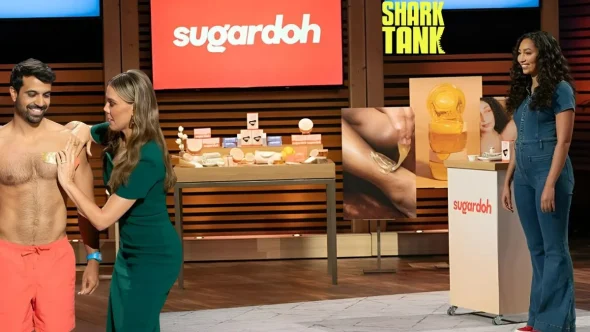
Guest Shark Kendra Scott Tries Sugardoh Sample on Shark Tank Season 16
Highlights
- Sugardoh appeared in the third episode of Shark Tank Season 16.
- The unique hair removal product captured Sharks’ attention with its sales figures.
- Sugardoh’s journey ended without a deal as the judges were concerned about its debt.
Shark Tank has often shown that simply having impressive sales figures does not guarantee a deal. The different investors analyze many other angles, including the debts involved in a business. One such example the Sugardoh presented in Shark Tank Season 16 episode 3.
Brought to the panelists by an Austin-based entrepreneur, Sugardoh captivated their attention in the first half of its pitch through an impressive sales record. But their excitement disappeared soon when they learned about the heavy debt involved in the hair removal business.
Sugardoh Shark Tank Season 16: A Quick Recap
Aspiring entrepreneur Aliyah Marandiz made her way to the Shark investors seeking $500K for 5% equity in Sugardoh. Her product was a unique ‘hair removal sweetener,’ which was an all-natural sugar-based dough made from sugar, water, and citrus. The product gently pulls hair from the root while exfoliating the skin.
To make the Sharks involved in the pitch, she called Guest Shark Kendra Scott to try the sample on her friend Richard.
Kevin O’Leary then added that the innovation was ancient and was found in Phoenician times. He made this comment because he felt that because women of the Mediterranean had been using it for years, Sugardoh had zero proprietary elements.
Reacting to this, Aliyah replied that the company had worked for two years to create a proprietary manufacturing process and formulation, which helped them develop their IP.
Sugardoh’s Painful Financial Debt and Sharks’ Reactions
Things were looking good for the Sugardoh founder until her pitch ended. Following this, the Shark investors raised questions regarding the sales. Aliyah said that Sugardoh was started in 2020 and made $50K in revenue by the end of the year. Next year, it became a viral sensation on TikTok and made $2.6 million in sales.
Such a massive and steady rise in sales amazed the Sharks, and they wanted to know more.
View this post on Instagram
The entrepreneur then said that in 2022, Sugardoh made $5.6 million. The company initially started in D2C and then grew to Amazon. By December 2022, the company expanded to 300 Ulta Beauty stores. In 2023, they reached across the US with a presence in 1300 stores.
But everything started going downhill after Aliyah revealed that she did not make any money from the $5.6 million in sales. When the Sharks inquired about the reason, she said it was due to their low margin of 60%.
View this post on Instagram
To tackle this, they updated their suppliers and implemented their manufacturing process this year. This made their margins reach around 80%. Last year alone, Sugardoh ended with a negative margin of 77%. To cope with the loss, Aliyah and her husband invested $400K of their personal money.
After all of these, the total debt for Sugardoh till the time of its Shark Tank appearance was $1.5 million. The company also had $1 million in inventory.
The reason why Aliyah had come on Shark Tank Season 16 was to get cash and help with retail. Hearing all this, the excitement of all the Sharks turned into disappointment.
Mark Cuban felt it was not a good choice to acquire retailers at this stage of the business. Additionally, he stated that while Sugardoh witnessed hyper growth, keeping up with the rapid pace was a huge challenge. The other investors also appeared skeptical about making an offer.
Sugardoh’s Ultimate Deal
Mark was the first investor to step out of the deal as he felt he could not help the entrepreneur grow her business in any way. Kevin felt the high valuation of $10 million was not justified given the huge debt amount involved in Sugardoh. Citing this reason, he declined to make an offer.
Next was Daymond John, who believed that Sugardoh’s hypergrowth could be detrimental to the business in the future. Additionally, the millions of dollars in debt made it a risky choice to invest in. So, he, too, exited the deal.
Kevin added Daymond’s comments, saying that by the time he gets his invested money back, he will be ‘older than the Phoenicians that invented this’.
Kendra Scott was reminded of her entrepreneurial days when she made mistakes similar to Aliyah’s. However, she chose not to make an offer owing to the high valuation and debt involved. Lori Greiner was the final Shark who refused to make a deal, citing the competitive market.
As a result, Sugardoh failed to get a deal on Shark Tank Season 16.
Conclusion
The journey of Sugardoh on Shark Tank Season 16 was loaded with moments of excitement and despair. While the investors were hooked in the first half of the pitch due to the impressive sales, they lost interest later on hearing about the debt involved. In the end, the founder walked out without a deal.
The Sugardoh business on Shark Tank highlighted the significance of handling scaling and debt in a competitive industry.





















